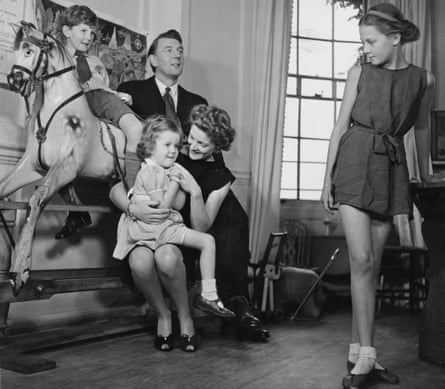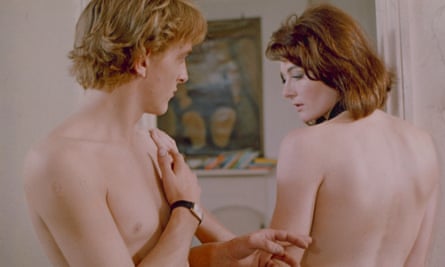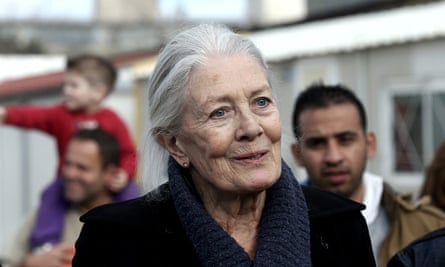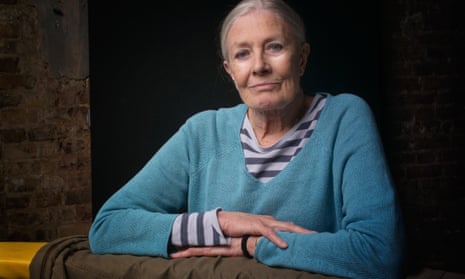‘Cheers,’ says Vanessa Redgrave. She clinks her glass of elderflower pressé against my coffee. At 79, with those cornflower-blue eyes and that great silver streak of hair, she looks as striking as ever. I tell her that my daughter loves watching her niece Jemma in the TV soap Holby. As compliments go, it’s not up to much for the woman who was proclaimed by Arthur Miller and Tennessee Williams as the greatest actor of their time, but she responds gracefully. “Oh, does she? How sweet! I’ll pass that on.” She could not be more charming.
Then we start the interview. Every question is dissected for falsehood, insult, bias, innuendo and booby traps. She is the bomb-disposal expert of interviewees.
We are sitting in the front row at the empty Almeida theatre in north London, where she is rehearsing for Shakespeare’s Richard III. I ask if the stage scares her. “Scared?” she replies, as if it’s the most ridiculous question in the world. “Scared? What about?” Going on stage? “No, not really.”
Has she never had any fear on stage? “Well, I’ve lived for 79 years so you’re allowing yourself a bit of a sweeping swath of time. Of course I’ve had stage fright.” Now, the suggestion that she might never fear the stage seems like the most ridiculous question in the world.
In Richard III, she plays the vengeful Queen Margaret, the bitter widow of King Henry VI, whose son has been murdered by Richard. Five years ago, she played another terrifying Shakespearean matriarch, Volumnia, in the film of Coriolanus (with Ralph Fiennes, who is Richard III in this production). Redgrave can be wonderfully steely – that slow, coruscatingly clear delivery, with every syllable another stab to the heart. She can also be wrenchingly tender.
It’s always been the eyes with Redgrave. You can see through them into her soul. So blue, so weepy, such longing; she was born to play Chekhov. Which of course, she has done beautifully. Twenty-five years ago, she was a heartbreaking Olga (the spinster teacher who tells her youngest sister, Irina, she would have married “any man, even an old man if he had asked”) in Three Sisters, alongside her real-life younger sister, Lynn, and niece, Jemma.
Redgrave might be most garlanded for her stage work, but she also has six Oscar nominations (Morgan: A Suitable Case for Treatment, Isadora, Mary Queen of Scots, Julia, The Bostonians, Howards End). When she finally won an Oscar in 1978, for playing the eponymous Nazi resistance fighter in Julia, she gave the most notorious acceptance speech in the Academy’s history, thanking it for refusing “to be intimidated by the threats of a small bunch of Zionist hoodlums”. In the previous year, she had funded a documentary in support of a Palestinian homeland. Effigies of her were burned by the Jewish Defense League, which picketed the Oscars.
Her politics have often attracted more headlines than her acting. She and her brother, Corin, were once leading members of the Workers Revolutionary party. In recent times, she has endured more than her share of tragedy; within the space of 14 months, she lost her oldest daughter, the actor Natasha Richardson (who suffered a traumatic brain injury after a skiing accident at the age of 45), Corin, and in May 2010, Lynn (yet another successful Redgrave actor with two Oscar nominations).
The Redgraves are the ultimate acting dynasty, going back five generations. Vanessa’s parents, Michael Redgrave and Rachel Kempson, were both actors. The tabloids have often feasted off the family with their penchant for romance, revolution and scandal. Michael was bisexual, as was Vanessa’s first husband, Tony Richardson, who left her for the actor Jeanne Moreau, and died of an Aids-related illness in 1991. Last year, Redgrave suffered a serious heart attack, and the newspapers were quick to report details about just how badly it had debilitated her. Perhaps it is not surprising she is suspicious of journalists.
Redgrave might be dogmatic in many ways, but her views can also be surprising – not least about women. In Richard III, as in Coriolanus, she plays a woman chiefly defined as a mother. Didn’t you say that being a mother is the ultimate role for a woman, I ask.

She bristles. “I don’t think I said that. It’s a very unusual combination of words for me.” Then she splutters to a stop. Redgrave has a terrible hacking cough. I tell her she’s right; I am paraphrasing her, and read back the actual quote: “We are child-bearers primarily and we are the weaker sex, and once we’ve given birth to our children, our life is by necessity bound to them. I wouldn’t advocate it any other way.”
She has another coughing fit, before nodding a terse reply.
“Well, I succeeded in saying what I meant.”
Is it correct that she has never considered herself as feminist? She smiles. “Yes, I would agree.” And her children went to private school? “Well, not all of them.” And she is convinced that Shakespeare was an aristocrat because a commoner could never have written how he did? “Well, now you’re getting into a very important subject.”
Does she still see herself as a revolutionary? “I think every artist is a revolutionary. That’s what Tennessee Williams said, and I think he put it very well.” Why? “The simple answer is you want to help change. Or before you can help change, you want to understand how can change be effected.”
You seem such a strange mix of revolutionary and traditionalist, I say.
But she’s not having any of it. “It’s fair for you to say whatever you like, but I’m not going to fall in with it. These labels are so nothing to do with what’s going on today. I think every journalist would do well to drop these outworn, outlived descriptive adjectives. They do not apply to anything, in my view.”
She splutter-hacks again. I ask her if she is OK – she sounds terrible. “I think some dust has caught in my chest.” She smoked all her adult life until the heart attack last year, when she gave up. How is she coping without her cigarettes? “Surprisingly well. I do, now and then, get a withdrawal because I was a big addict.”
Redgrave is dressed in blue top, tracksuit bottoms and blue trainers. She is six foot tall, still an intimidating presence, but there is something frail about her. The heart attack took a lot out of her. Is it true that her lungs are shattered; that she only has 30% capacity? “I’ve no idea,” she says imperiously. “I’ve never said how much of my lungs have been destroyed and I’ve never been told myself, so I don’t know how you know.”
It’s been printed in the newspapers.
“And I’m saying to you, do you believe that?” (The 30% figure is a direct quote from an interview she gave to the London Evening Standard last September, five months after her heart attack.) Did she think she was going to die? “At the time? When I was in hospital I wanted to die,” she says gently. Why? “Because it was just getting too tiring.” Life or being ill?
“Trying to live was getting too tiring. I was with my daughter, and I said, ‘I’m sorry, I just think I’m going to have to give up,’ – knowing she’d be unhappy, of course. And she was wonderful.” How did Joely (yet another successful actor) encourage her to keep living? “By telling me I could. Her saying I could give up released me.”
I have never met somebody who can go from wilfully cantankerous to heartstoppingly tender so quickly; who can make me want to scream with frustration and move me to tears in the same sentence.
“I told her what I thought I had to do … just give up. But I had to tell her that because I guess it’s my psychology. I didn’t want to hurt her, but I knew it would hurt her.”
I know it’s a strange question to ask a Marxist, I say, but do you have faith? She smiles, almost beatifically. “Yes, certainly I do. And the reason why I do is because I don’t consider science and religion two fixed opposites. Human beings have felt the need to explain things that they couldn’t explain, and acknowledge the existence of things they can’t explain but want to.” She is talking so slowly, so deliberately, she could be setting a dictation test.
So religion and Marxism is another contradiction she is happy to embrace? “Yes, because if you’re not happy to embrace contradictions you’re not going to get very far in understanding anything.”
How does her faith express itself? “By reading, by inquiry, people I have discussions with, sometimes I go to church. It’s a Catholic church, because of the people I know.”
She says she has always had faith; always liked to go to church. As she talks, I can’t help wondering whether she wanted to die because she hoped to be reunited with loved ones that she has lost.
Before the question is out, she cuts me off. “No, don’t go there. Not at all. I just meant physically I felt I couldn’t go on trying to live. Not that life is too painful for me. Not at all. No.”

Over the past five years, Redgrave has done so much work – in films such as the comedy-drama Song for Marion, alongside Forest Whitaker in The Butler, with Steve Carell in the Oscar-nominated Foxcatcher, and on stage in New York alongside Jesse Eisenberg in The Revisionist and opposite James Earl Jones in the Old Vic’s Much Ado About Nothing, directed by Mark Rylance.
Does working make things easier? “Easier than what?” she snaps. Well, I say, if you have too much time to think, you can drown in grief. “Ah, well, now it seems to me that you are talking about someone who’s a workaholic, or unable to stop being an actor.”
I didn’t mean that, I say, but it’s interesting you take objection to it. “Well, I do. It’s very unlife-enhancing. Very.” But yes, she says, there have been times she has been addicted to work, just as she was to cigarettes.
“It can happen for any number of reasons,” she says. “One is called paying the rent. Or the mortgage.”
You become a slave to rent?
“No, you’re putting words into my mouth.”
And we’re off again. “I’m not putting words in your mouth,” I say.” ‘I’m asking a question.”
“You just have put words into my mouth.”
“No I haven’t. They are my words, my question. You’re very difficult to interview, aren’t you?”
“I don’t think so. I think I’m illuminating. Hahahaha!” She rocks her head back, laughing.
And she really is heaving with laughter so much that I’m now every bit as worried for this dyspeptic national treasure as I was when she was having her coughing fit. We seem to have reached a new understanding. The war is over.
I’ve been watching a load of Redgrave films back to back. She started off as a sexy young thing, a symbol of the swinging 60s (in films such as Antonioni’s Blow Up and Morgan: A Suitable Case For Treatment) and gradually moved into ever more miserable territory. So often she seems to die for her politics (Julia) or be punished for her sins (Atonement and Ken Russell’s The Devils) or just be generally angst-ridden (Howards End and Bostonians). Rarely do we see Redgrave laugh in cinema – and she’s got a lovely laugh.
You have a reputation for being serious, I say. “Well, I am a very serious person.” Has she ever felt she was too serious? “No! And I don’t care how many people in the press have said that. And there have been times when I couldn’t and didn’t laugh, but I think I’ve grown a bit stronger now.”
Has she always wanted her work to have a political purpose? “Not a political purpose. Everybody always jumps to that.” What does she mean? “Well I’ve just noticed, Simon, that people jump to political. Perhaps it’s because they’re talking to me. They know I have been very political. I am also and have been for a long time very not political. It doesn’t mean I don’t have any politics though.”
For a long time, Redgrave has said she is interested in human rights, not politics – and she does have a distinguished record as a human rights campaigner. But I’m not sure that I understand the distinction. She explains, with a devastating simplicity.

“Politics is about divisions. Wherever you come in on the subject there are divisions.” Does she regret the divisions it has caused in her life? “I can’t regret. I can only be thankful for the contribution that it made to my life.”
Is politics a negative word for her now? “It’s not a negative word, it’s negative. Period.”
In 2014 she made a documentary about Bosnian labour rights with her son Carlo Nero, whose father is Redgrave’s long-term partner, the Italian actor Franco Nero. She is now making a new film with him about refugees in Greece and Lebanon.
Human rights, she says, have always been at the heart of her life – politics just sidetracked her. She talks of Hitler’s genocide, and how Chamberlain refused visas for thousands of Jewish refugees right until the end of 1938. “I know this history like it’s my family history, though it’s not, really. But it has obsessed me, because I was a child of the second world war and I wanted to know if what happened could happen again, how could we stop them.”
How did she feel when she was labelled anti-semitic following The Palestinian? “That was absurd, calling me anti-semitic. Everybody has a right to think whatever they want about anybody, but since I so wasn’t and never have been, what can you do? You think, ‘OK time will pass on that one’.”
But it didn’t. In fact, it damaged her movie career just when she was set to be one of the great Hollywood stars. “Yes,” says Redgrave today, “but that’s not really important. What’s important is what’s crying out in our world for justice – the Israel-Palestine question.”
Looking back, does she wish she had been more careful with her words – that she had not said: “Zionist hoodlums”? “Oh no.” But then she stops and starts again. “Well, I mean I wish I’d written myself a better speech, but that’s not the point, either.” In the end, it comes down to one thing, she says – respect for human rights.
“I am practically at the very end of my life, so it’s a good thing I’m still worried and that I’ve not fallen back into my armchair where the old blues will get me. I’ve still got to do something to help, however tiny it is. I always think of the old Hebrew saying, which is translated roughly into: ‘He who saves one life saves the world’, because it’s pretty ghastly to think of all the people we’re not saving.”
She has to get back to rehearsals. It has been little more than an hour, but it feels as if we’ve been through a lot together. A lifetime. And that we’ve reached an understanding, of sorts. “I wasn’t looking forward to it, but thank you,” she says. “I don’t like giving interviews when I’m preparing something.”

“Oh, come off it,” I say. “You don’t like giving them, full stop.”
She smiles. “Well, I’m always hopeful, or I used to be always hopeful, that it turned out the journalist was somebody I respected.”
I tell her I’m glad she didn’t give up on life. “Thank you.” She smiles a lovely, warm smile. “Gosh, that’s really sweet of you.”
As she walks off, I ask if she lives in England all the time or part of the year in Italy. She has one last snap for old time’s sake. “In England. But I go to spend time with my husband in Italy, who you didn’t ask me about.”
I apologise, and ask her to tell me about her non-legally-binding marriage to Nero. But she’s halfway out of the door. “I won’t. Thank you, Simon, goodbye.” As she leaves, I shout after her: “Vanessa Redgrave, who is the love of your life?”
With her back to me, she shouts out: “One of the loves of my life is Franco Nero.” And the others? “My children, my relatives, my co-mates who I’m working with. Thank you very much, Simon. Goodbye. Hahaha!”
And now the formidable, forbidding Vanessa Redgrave is laughing like a schoolgirl. “That is the weirdest end to an interview I’ve ever had. Hahahahha!” And she shuts the door, and disappears.
- Richard III is at the Almeida theatre, London, until 6 August and can be seen in cinemas around the world on 21 July

Comments (…)
Sign in or create your Guardian account to join the discussion